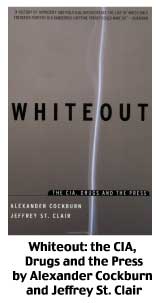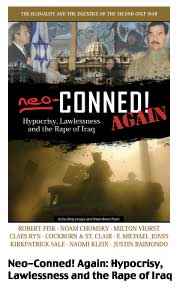|
|
home / subscribe / donate / tower / books / archives / search / links / feedback / events / faq
|
|
Today's Stories March 8, 2007 Elaine Cassel
Christopher Ketcham Christopher
Ketcham Alexander Cockburn / Jeffrey
St. Clair Winslow T.
Wheeler Sean Donahue Dave Lindorff Evelyn Pringle Tao Ruspoli Website of the Day
March 6, 2007 Gary Leupp Uri Avnery Patrick Cockburn Saul Landau Corporate Crime Reporter Ron Jacobs Mike Roselle P. Sainath Joshua Frank Aniket Alam Dave Zirin Website of
the Day
March 5, 2007 Greg Moses Patrick Cockburn James Petras Frida Berrigan Marjorie Cohn Douglas Kammen
and S.W. Hayati Sen. Barack Obama Michael Young Dave Lindorff Sonja Karkar Website of the Day
March 3 / 4, 2007 Alexander Cockburn Corporate Crime
Reporter Jeffrey St. Clair Patrick Cockburn Ralph Nader M. Shahid Alam Gilad Atzmon Fred Gardner George Ciccariello-Maher Rock &
Rap Confidential Gillian Russom Michael McPhearson Kevin Zeese Sunsara Taylor Wendy Thompson Kenneth Rexroth Missy Beattie Don Monkerud Tina Louise Poets' Basement Website of the Weekend
March 2, 2007 Roger Morris Phil Gasper Mike Roselle Robert Bryce John V. Walsh Sherwood Ross China Hand David Rosen Chris Genovali Peter Harley Website of the Day
March 1, 2007 Laura Carlsen Paul Craig
Roberts Ray McGovern Christopher
Brauchli Najum Mustaq Brent Bowden Tina Richards Ethan Nadelman Mike Stark Wadner Pierre
/ Jeb Sprague Mike Whitney Website of
the Day
February 28, 2007 Peter Linebaugh Tao Ruspoli China Hand Marjorie Cohn Sarah Olson Susan Van Haitsma Nicole Colson Harvey Wasserman William S. Lind Nicola Nasser Website of the Day
February 27, 2007 Tariq Ali Tom Barry Uri Avnery Antonia Juhasz / Raed Jarrar Jeff Nygaard Hugh O'Shaughnessy Mitchell Kaidy Carl Finamore Anne McElroy
Dachel Ramzy Baroud Andrew Rouse Website of the Day
February 26, 2007 Franklin Lamb Bill Quigley Greg Moses Col. Dan Smith Ralph Nader Paul Buchheit Jeff Leys Dave Zirin Mike Whitney Michael Dickinson Website of the Day
February 24 / 25, 2007 Jeffrey St.
Clair R. T. Naylor Gary Leupp Saul Landau Ron Jacobs Jeffrey Blankfort Chris Sands Gary Freeman Larry Portis P. Sainath Lee Sustar Kevin Wehr Ken Couesbouc Soffiyah Elijah Kathlyn Stone Dave Lindorff Jason Kunin Kevin Zeese Remi Kanazi Missy Beattie Poets' Basement Website of the Weekend
February 23, 2007 Franklin Spinney Jonathan Cook Patrick Cockburn Kathy Kelly Chris Dols Evelyn Pringle Stephen Pearcy Dan Brook Yifat Susskind Website of
the Day
February 22, 2007 Robert Fantina Tariq Ali Michael Shank John Ross Christopher Brauchli Cindy Litman Niranjan Ramakrishnan Kevin Zeese Aseem Shrivastava Reza Fiyouzat Illinois Students Against the
War Website of
the Day
February 21, 2007 Maass / St.
Clair Sharon Smith Greg Moses Margaret Kimberly Ralph Nader Nicola Nasser Mike Whitney Tao Ruspoli Byeong Jeongpil Corporate Crime
Reporter Josh Mahan Website of
the Day
February 20, 2007 Sgt. Martin
Smith Werther Corporate Crime Reporter Carl G. Estabrook China Hand Joshua Frank Megan Boler John Feffer Daryll E. Ray Alan Gregory Website of the Day
February 19, 2007 Paul Craig
Roberts Gary Leupp Ron Jacobs Michael F.
Brown Robert Jensen Roger Burbach Monica Benderman Sonja Karkar John Walsh Talli Nauman Website of the Day
Feburary 17 / 18, 2007 Alexander Cockburn Tao Ruspoli Gary Leupp Jeffrey St.
Clair Roger Morris Uri Avnery James Brooks Sen. Russell
Feingold Linn Washington, Jr. Michele Brand Fred Gardner Mitchel Cohen Mike Ferner David Swanson P. Sainath Mike Stark Missy Beattie Jonathan Franklin Website of the Weekend
Marc Levy Andrew Cockburn Glen Ford Greg Moses Ron Jacobs John W. Farley James Marc Leas Tim Rinne Albert Wan Website of
the Day
Patrick Cockburn Saul Landau Stephen Lendman Evelyn Pringle Michael Simmons Kevin Zeese Dave Lindorff Pete Shanks Peter Rost Lenni Brenner
/ Gilad Atzmon Website of the Day
February 14, 2007 Tao Ruspoli Dick J. Reavis Margaret Kimberly Christopher Brauchli Paul Craig
Roberts John Ross Michael F.
Brown Dave Lindorff J.L. Chestunut,
Jr. Don Fitz Michael Donnelly Dr. Susan Block Website of
the Day
February 13, 2007 Uri Avnery Patrick Cockburn Ralph Nader Marjorie Cohn Col. Dan Smith Col. Douglas
MacGreagor Thomas Power Nicola Nasser David Swanson Columbia Coalition
Against the War Website of the Day
February 12, 2007 Patrick Cockburn Paul Craig
Roberts John Walsh Dr. John Carroll,
MD Greg Moses Nicole Colson Dave Lindorff Ray McGovern Doug Giebel David Swanson Website of the Day
February
10 /11, 2007 Alexander Cockburn Gabriel Kolko Patrick Cockburn Jeffrey St.
Clair Kevin Alexander Gray M. Shahid Alam Greg Moses Paul Craig
Roberts George Ciccariello-Maher Kevin Zeese Turner / Kim George Duke Walter Brasch Shepherd Bliss Missy Beattie Peter Harley Pat Wolff Poets' Basement Website of the Day
Conn Hallinan Gary Leupp Lee Sustar Nikolas Kozloff Newton Garver Yitzhak Laor Dave Lindorff David Swanson Website of the Day
February 8, 2007 John V. Walsh Marjorie Cohn Trish Schuh Ron Jacobs Laura Carlsen Ramzy Baroud Brenda Norrell Bryan Farrell Judith Scherr Website of
the Day
February 7, 2007 Daniel Wolff Tao Ruspoli Tony Swindell Sharon Smith Ken Couesbouc Jeff Cohen Col. Dan Smith Tom Kerr Joshua Frank Adam Elkus Stephen Fleischman Website of
the Day
February 6, 2007 Diana Johnstone Gregory Wilpert Norman Solomon Dave Lindorff William Blum Mike Ferner CP News Service Evelyn Pringle Christopher Brauchli Alan Cabal Website of the Day
Dave Zirin Uri Avnery Ron Jacobs Paul Craig Roberts Newton Garver Bruce Anderson Saul Landau Ralph Nader James T. Phillips Mike Whitney Kenneth Rexroth Website of the Day
Alexander Cockburn Tao Ruspoli Jeffrey St.
Clair Patrick Cockburn P. Sainath Sen. Russell Feingold Diane Christian Brian Cloughley Diana Barahona Timothy J. Freeman Conn Hallinan John Ross Greg Moses Missy Beattie Joshua Frank Evelyn Pringle Stephen Fleischman Muhammad Idrees Ahmad Poets' Basement Website of the Day
Chris Kutalik R. Gibson /
E. W. Ross Pam Martens John Feffer Daryll E. Ray Ronald Bruce
St. John Mitchel Cohen Website of
the Day
Diane Farsetta Marjorie Cohn Mark Scaramella Ranni Amiri Christopher Ketcham Winston Warfield Corporate Crime Reporter Thomas P. Healy Website of the Dau
January 31, 2007 Patrick Cockburn Jean Bricmont Tao Ruspoli James T. Phillips William Johnson Tim Wilkinson Evelyn Pringle Joshua Frank Ramzy Baroud Mickey Z. Website of the Day
Subscribe Online
|
March 8, 2007 Breeding Rural Poverty and Environmental DegradationBrazil's Ethanol PlanBy ISABELLA KENFIELD On Jan. 22 the Lula administration announced it will increase federal funding for Brazil's sugar-based ethanol industry by almost US$6 billion over the next four years. One day later, U.S. President George W. Bush declared in the State of the Union address his goal to reduce U.S. use of gasoline 20% by the year 2017. The general response in Brazil to Bush's announcement was overwhelmingly positive. Luis Fernando Furlan, Minister of Industry, Development, and Commerce, was quoted in the Gazeta Mercantil as saying he received Bush's announcement "with applause." "It is a fantastic business opportunity," Luis Carlos Correa Carvalho, an industry consultant, told Reuters. "We have never had such a great opportunity for the substitution of petroleum." The United States is currently the largest importer of Brazilian ethanol. Last year it imported 1.74 billion liters, or 58% of the total three billion liters that Brazil exported. For the United States to reach Bush's target reduction of gasoline use, the country will need an additional 135 billion liters of ethanol annually. Because it will not be able to produce the entire amount, no doubt a large portion will come from Brazil. Brazil is the global leader in ethanol exports. In 2006, the country exported about 19% of the total 16 billion liters it produced, providing 70% of the world's supply. This amount will soon increase. A partnership between the Ministry of Science and Technology and the University of Campinas in São Paulo is currently conducting a study to plan Brazil's ethanol exports as a substitute for 10% of the global use of gasoline in 20 years. If this plan is successful,
the country's ethanol exports will total 200 billion liters by
2025-an increase of almost 67%. The geographic area planted with
sugarcane will increase from 6 million to 30 million hectares.
Is Ethanol the Solution or the Problem? Many citizen organizations in Brazil are concerned that what appears to be an economic panacea may be a social and ecological disaster. They claim that as the industry expands and more hectares are planted mono-cropping sugarcane, existing problems in rural areas of landlessness, hunger, unemployment, environmental degradation, and agrarian conflicts will be exacerbated. A recent declaration from the Forum of Resistance to Agribusinesses, a consortium of non-governmental organizations (NGOs) throughout South America states, "The implementation of the model of production and export of biofuels represents a grave threat to our region, our natural resources, and the sovereignty of our people." There is concern that while expansion of the ethanol industry may boost Brazil's GDP and some Brazilians will become very wealthy in the process, the majority of the population will not benefit from the ethanol export boom. Given U.S. plans to increase imports of Brazilian ethanol and the alliance slated to be forged during Bush's South America visit in March, it is likely the livelihoods of many Brazilians, especially the rural poor, will be subordinated to maintain U.S. consumption. "The era of biofuels will reproduce and legitimize the logic of the occupation of rural areas by multinational agribusiness, and perpetuate the colonial project to subvert ecosystems and people to the service of the production and maintenance of a lifestyle in other societies," states the Forum. The group alleges that Brazil's effort to supply the Global North with ethanol is simply a repeat of the same model of economic growth via agro-export that has been practiced since Portuguese colonization. Agricultural production for export in Brazil has traditionally been a model imposed on the country by more powerful nations in the North, alongside a small group of Brazilian landowners. Agro-export generates vast amounts of wealth for a few Brazilians, and exploitation and poverty for many others. Brazil's high rate of income inequality is inseparable from the fact that it also has one of the most unequal rates of land distribution. The sugar industry is a classic example of Brazil's land and income inequality.
Brazilian ethanol is produced from sugarcane, which has always been a primary agricultural commodity for the country. Because ethanol relies on sugarcane as its primary material, the industry is linked to the social and economic dynamics in rural areas that have developed from sugarcane production since the colonial era, most importantly labor exploitation and land concentration. According to Marluce Melo of the Pastoral Land Commission (CPT) in the northern Brazilian city of Recife, Pernambuco, "Rural poverty has always been intrinsically related to the economy of sugarcane. Even in the 1970s, when Pernambuco was the largest national producer of sugarcane, the levels of poverty were amongst the highest in the world." In many ways, things have changed little on the sugarcane plantations since colonial times. "The problems with [sugarcane's] production today are very similar to the problems it generated hundreds of years ago," says Maisa Mendonça, Director of the São Paulo-based NGO Rede Social. Sugarcane fieldworkers endure some of the hardest labor in the world. According to Mendonça, Brazil has the lowest cost of production in the world because of the industry's dependence on labor exploitation, including massive slave labor, and its refusal to implement environmental regulations. In São Paulo the cost of production is US$165 per ton; in Europe it is US$700 per ton. I n São Paulo the median monthly salary for a field laborer on a sugar cane plantation is US$195; in Pernambuco it is US$167. It is estimated that 40,000 seasonal migrant laborers from the Northeast and Minas Gerais state work in the annual harvest in São Paulo. They work long hours in extremely hot temperatures, cutting as fast as they can because their pay is based on the weight of their cuttings. Maria Aparecida de Morães
Silva, at the State University of São Paulo, reports that
the required rate of productivity for cane cutters is increasing.
In the 1980s, the average rate of productivity demanded of an
individual cutter was between five and eight tons of sugarcane
cut per day; today it is between 12 and 15 tons. From 2004 to
2006, the Pastoral of Migrants registered 17 deaths from excessive
labor in São Paulo, and in 2005 the state's Regional Delegation
of Labor registered 416 deaths of workers in sugar-based ethanol
production. Concentration in the Industry As it grows, the sugar-ethanol industry has undergone a process of increasing concentration and vertical integration, as large corporations invest in land and production. According to a banker who finances loans to the ethanol industry in São Paulo and asked to remain anonymous, in the past control of the industry was dispersed among smaller businesses. Sugar mills were owned by individual owners who controlled both cultivation and milling. Today Brazil has 72,000 sugar producers, and the ten largest producers still control less than 30% of production. However, the banker says, "The current trend is toward concentration, with a large number of mergers and acquisitions." Many of the larger companies that are buying out the smaller companies are multinational agribusiness corporations. "The participation by foreign capital in the production of sugar and ethanol is currently 4.5%, and this number is going to grow. Recently many foreign groups are looking to invest in this industry in Brazil, due to one of the lowest costs of production in the world," says the banker. Sugarcane seems to be following the same pattern of foreign investment and concentration as that of soybeans. Today almost all soybean production in Brazil is controlled by a handful of multinational agribusinesses. Many of the corporations that control soybeans are now investing in the ethanol industry. Among the multinational agribusinesses investing in the industry are, according to the banker, Louis Dreyfus Commodities and Tereos, both based in France, as well as U.S.-based Cargill. The Louis Dreyfus site states the company is one of the three largest sugar traders in the world, and owns three Brazilian sugar mills with a fourth mill currently under construction in Mato Grosso do Sul . The company produces 450,000 tons of sugar and 150,000 cubic meters of ethanol annually. According to the Cargill website, in addition to being Brazil's largest soybean exporter and second-largest processor, Cargill is the largest operator of sugar, both in terms of Brazilian sugar production and export sales, as well as global sugar trading. As more land is planted as a monoculture of sugarcane, and control of the industry becomes more concentrated, rural poverty increases. According to Melo of the CPT, "Monoculture has created a huge dependency on the sugarcane economy in the [Pernambuco] region, and impedes the creation of other forms of work and income. The monoculture of sugarcane also leads to an increasing concentration of lands in the hands of the sugar mills. "For about 15 years, there
were 43 sugar mills and alcohol distilleries in Pernambuco. Currently
only 25 of these companies control practically all of the land
in the 43 municipalities of the sugarcane growing region of the
state ... In the last two decades, practically all of the small
properties in the region have disappeared, with the forced destruction
of the sites, and the expulsion of the workers to the periphery
of the 43 municipalities of the sugarcane region and to the larger
cities of the neighboring metropolitan region. In this same period,
about 150,000 jobs were lost when 18 companies closed and the
lands and sugarcane processing was concentrated in the 25 sugar
mills and distilleries that remain ... This has provoked a generalized
'slumming' of the workers, which has aggravated hunger."
Economic Boom or Environmental Bust? Industry, government, and mainstream media in Brazil generally argue that increasing ethanol exports will boost economic growth and sustainable rural development, while simultaneously helping to curb global warming by helping the world reduce its dependency on fossil fuels. But contrary to the "green" image evoked by industry advocates, the monoculture of sugarcane leads to massive environmental destruction. According to Melo, in Pernambuco only 2.5% of the original forest of the sugarcane region remains. In order to satisfy future global demand, Brazil will need to clear an additional 148 million acres of forest, says Eric Holt-Gimenez of the NGO FoodFirst, based in Oakland, CA. The damaging environmental effects of monocropping sugarcane are, in the São Paulo banker's mind, the most troubling aspect of the sugar-ethanol industry. He claims that the sugar takeover is "pushing other crops to the agricultural frontier." He explains that, "because
sugarcane generates a high price per hectare, the regions with
better climactic conditions are dominated by this crop, which
results in sugarcane occupying lands that before were planted
to grains and used for grazing livestock. Grain producers move
to more remote regions, such as the center-west, which before
were used for cattle. The result of this flux is that cattle
ranchers seek new areas such as the Amazon region." Resisting Changes in Land Use As the expanding ethanol industry spreads rural poverty and loss of rural livelihoods due to increased land concentration and environmental destruction, the number and intensity of agrarian conflicts has risen. Brazil has one of the highest rates of income and land inequality in the world, and a well-articulated and organized agrarian reform movement of the rural poor. This has created a smoldering socio-economic fire that could very well be ignited with ethanol. On Feb. 19 the Movement of Landless Rural Workers (MST) and the Central Union of Workers (CUT) organized about 2,000 MST members and rural workers to non-violently occupy 12 plantations totaling 15,600 hectares in nine municipalities of São Paulo state. According to the newspaper O Estado de São Paulo, "MST leader José Rainha Júnior said the objectives of the occupations are to force the government to acknowledge the emergency need for agrarian reform, and to call attention to the social problems resulting from the expansion of sugarcane in the state." Melo reports that in 2005, Pernambuco registered 194 conflicts over land-a rate higher than the previous five years. She also reports that in the same year a general strike by sugarcane workers was violently repressed. "The employed and unemployed workers who struggle for agrarian reform are constantly threatened and coerced by the landowning companies and by the police at their service," she says. CPT data shows 60 labor conflicts for 2005 alone, while between 2000 and 2004 the highest number of labor conflicts was nine. As the Lula administration proceeds full-speed ahead with ethanol export as a model for economic development, it is turning its back on the millions of Brazilians who voted for the Workers' Party based on its promises to implement real social and economic changes, especially agrarian reform. According to Melo, "The Lula government has strengthened the historical cane-production model imposed on the country based on monoculture, and concentrated landholdings and large companies. He has not shown any interest in creating alternatives to this perverse model." Can there be viable economic alternatives to sugarcane monocropping? " Our evaluation is that the government needs to combat hunger," says Mendonça. "The government wants to become a factory to supply rich countries with cheap energy. This is compromising agrarian reform and food production." What the social movements, many NGOs, and other organizations agree on is that Brazil needs to incorporate the concepts of food sovereignty into its development policy, prioritizing the land to produce food for Brazilians. Food sovereignty includes both the obligation of governments to ensure that their populations have access to nutritious foods in adequate quantities, and the right of people and countries to define their own agrarian policies, and produce foods destined to feed their populations before producing for export. But food sovereignty will be unattainable without a comprehensive agrarian reform to keep family farmers on the land, producing and distributing healthy food to local populations. As it is currently developing, the Brazilian ethanol industry represents a direct challenge to food sovereignty and agrarian reform. Ethanol production to sustain the enormous consumption levels of the Global North will not lead the Brazilian countryside out of poverty or help attain food sovereignty for its citizens. Isabella Kenfield is a freelance journalist based in
Brazil and a contributor to the IRC Americas Program www.americaspolicy.org. |
CounterPunch Books The Gang's All Here: Judy Miller, Bob Woodward, Jeffrey Goldberg, Rupert Murdoch, Bill O'Reilly...End Times Leaves No Reputation Unstained!  Buy End Times Now! CounterPunch Books! Saul Landau's Bush and Botox World with a Foreword by Gore Vidal  Click Here to Order!  Michael Neumann's Devastating Rebuttal of Alan Dershowitz Grand Theft Pentagon: Tales of Greed and Profiteering in the War on Terror by Jeffrey St. Clair           The Occupation by Patrick Cockburn         CITY BEAUTIFUL By Tennessee Reed     Bruce Springsteen On Tour By Dave Marsh                 |